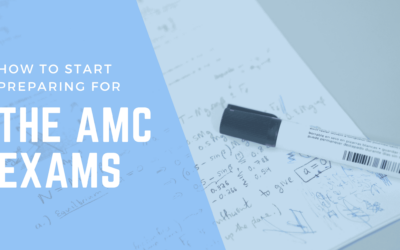…and how some ambitious students can reap huge benefits
There have been some major shifts in the college admissions landscape over the last few years. These shifts have changed the value of the AMC for certain students, and they have also changed how a student should prepare.
Brief recap: what’s the AMC?
It’s an annual exam run by the MAA for high-school math fans and “mathletes” featuring much more difficult questions than the SAT/ACT. Therefore it does a farbetter job of identifying early talent. It is also the “feeder” exam for the US Math Olympiad team.
Why do I care?
Because the way students get into top colleges has changed so much our intuitions about what “ought to be enough” no longer apply.
How has the AMC itself changed?
- It’s now given in November instead of January
- It’s now given online as well as at schools
- It’s become consistently more difficult over the past five to ten years
- Participation by students outside the US has skyrocketed
These changes don’t make a huge difference yet, but what they imply about the future of the AMC does.
How has its importance changed?
I should probably write a longer essay about this, but in a nutshell: The ACT/SAT can easily distinguish between a mediocre student and a good one. But they can’t distinguish between good and great. Instead, these tests inadvertently distinguish between hard-working and very hard working, with little focus on talent beyond a certain moderately high level.
Talent—i.e. potential future success—is what’s most important to colleges, but the ACT/SAT isn’t giving colleges the insight they need into this dimension. (This underlies some of the recent shifts in the testing industry.) That task is increasingly falling to other sources, and the AMC is quickly becoming one of the main ones.
How has preparing for it changed?
The same way that preparing for the ACT/SAT changed about 20 or 30 years ago: it’s becoming professionalized. What used to be an exam that you could just decide to take cold on test day has become something you prepare for for an extended period.
Also, the way you prepare has changed, because there are really two routes to success on the AMC:
- Pretend it’s the LSAT, and just work dozens and dozens of past exams until you have pretty much seen it all
- Pretend it’s a “thinking competition,” and learn new problem-solving skills that work in a wide range of situations
Option #1 is more popular, especially outside the US, because it’s easier to plan out how to do it, and for many international students, simply spending hundreds of hours coming to master the test is a viable option.
Option #2 is a better choice for many US students because they have less time to devote, have more resources to devote to developing true expertise, and need more of the general problem-solving skills this training develops.
I’ll say that last part again in a different way: the US has been lagging most developed countries in critical thinking and general problem-solving for quite a while now. The AMC helps our best and brightest learn the critical skills that are necessary for high-level competitiveness in future markets, and which most of the student population increasingly lacks.
What should I be asking in response?
If you haven’t considered the AMC, you should ask these questions:
- Do I enjoy math (or at least, do I enjoy it when it’s interesting)?
- Is it important to me to attend a top school, and to have a challenging and rewarding career in a cognitively demanding field?
- Could I see an academic study becoming for me what varsity sports are for student-athletes?
If you’re already planning to prepare for the AMC, or have started preparation, you should ask these questions:
- Do I have a concrete, realistic plan for success?
- Historically, have I gained at least ten points per month of preparation on my practice tests?
- Am I continuing to improve?
- Is what I’m learning still both helpful and interesting?
What should I be doing?
- If you have questions, get in touch with me at [email protected].
- If you are not yet routinely achieving AIME-qualifying scores in your practice tests, enroll in, and work through, my AMC 12 preparation course.
- If you are interested in being coached by me, visit our Start page so we can have an exploratory chat.




0 Comments